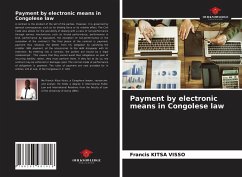A contract is the product of the will of the parties. However, it is governed by general consequences such as its binding force or its relative effect. The Civil Code also allows for the possibility of dealing with a case of non-performance through various mechanisms such as forced performance, performance in kind, performance by equivalent, the exception of non-performance or the resolution of the contract.1 The final phase of the contract is payment; payment thus releases the debtor from his obligation by satisfying the creditor. With payment, all the accessories to the debt disappear with its extinction. By entering into a contract, the parties are bound by a legal relationship2 . This means that they cannot avoid their obligations on pain of incurring liability; rather, they must perform them. If they fail to do so, the contract may be enforced or damages paid. The normal mode of performance of obligations is payment. The rules of payment are now provided for in articles 133 et seq. of the Congolese C.C. LIII3.








